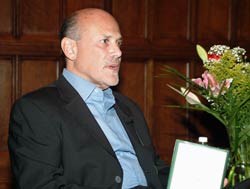A Journey From the Land of No
In 1979, as the discontent of Iran's middle and working classes escalated into massive demonstrations, the ruling monarch, the Shah, fled the country. It was not long before a full-scale revolution erupted and the religious leader, the Ayatollah Khomeini, who had had become a symbol of opposition to the Shah's regime, returned to Iran from exile in Paris. Within a few months, he had become the country's ruler and declared Iran an Islamic republic. The deep-seated conservatism of the Muslim fundamentalists became law, requiring women to wear the veil, banning alcohol and Western music, and reinstating punishments prescribed by Islam.
That same year, Roya Hakakian was a 12-year-old Jewish girl living in Tehran, experiencing firsthand the imposition of a religious culture that was not her own. Barry Rosen was a 36-year-old press officer at the U.S. Embassy in Tehran and one of the 52 hostages who would be held for 444 days until February, 1981. Both shared their perspectives from that time in a TC BookTalk discussion centered on Hakakian's book, Journey From the Land of No.
As a twelve-year-old girl, though she believed change would be good for the country, Roya noticed that women were being treated differently as a result of the revolution. "At that young age, I kept thinking that if you came to Iran in '79, '80, '81 or '82, the only way you would know we underwent a revolution was because women looked different," Hakakian said. "The first thing that went was women's rights."
Despite her current belief that intellectuals should have acted to stop this policy, she said, the reality was that men who were sympathizers and intellectuals did not join women who marched in the streets to protest. She was told, even as a member of a Jewish congregation, that, like Muslim women, she was considered to be unclean and therefore unfit to replace a young boy cantor who was leaving to attend school. "In Iran, Jewish women were treated the same as our Muslim neighbors," Hakakian explained. "Basically, that women were meant to become mothers and nurturers-their lives had little meaning except in the context of the family."
The revolution, which was long in the making, quickly got out of the control of those who were hoping for a better life. "Generations were invested in bringing this revolution about, and three months later they could not say, 'We were wrong, this is out of our control,'" Hakakian said.
Rosen, too, pointed out that the majority of the people who went into the streets in protest were the poor and downtrodden who just wanted to get rid of the Shah. "[They were] people who wanted a change in life, not a religious life," he said. The educated Iranians, he said, fled rather than fight for what they wanted.
"As for the Jewish community," Rosen said, "it was entirely supportive of the Shah because they felt he was supporting their rights. They were afraid of someone bringing in an Islamic social order."
Hakakian acknowledged that assessment, but said that Jews under age 30 were sympathetic to the revolution. "There was almost no one who was a student who just didn't love it." In fact, Hakakian, herself, even started a revolution in her own school.
Rosen noted that Hakakian never mentions in her book how she and her family felt about the student takeover of the U.S. Embassy on November 4, 1979. She replied, "God forgive me. We were for it." In hindsight, Hakakian said, she believes the educated class should have objected to the take-over and realized "this was bad for everyone."
Hakakian's parents "hated" the Ayatollah, she said, and were fearful of what would happen to them as Jews, particularly after a swastika appeared across the street from their home. Yet, as a teen-ager, she wanted simply to be Iranian, rebelling against her parents and reading communist literature and poetry that came in from the Soviet Union.
Hakakian soon became disillusioned with the revolution. Her Hebrew school was taken over by the government and run by a female principal, who recited a daily litany to the young girls about the "evils" they could bring upon the society if their hair were to peek out from behind a scarf be revealed to a man.
Jews did not have an easy life during the revolution, she said, enduring much that conflicted with their beliefs such as having to attend school on Saturdays. But at least they were allowed to leave the country.
"When we left Iran," Hakakian said, "it was not because our neighbors had turned against us. We left because things became miserable in Iran for the average Iranian if you didn't fall in line with the regime."
For political reasons, neither Rosen nor Hakakian can return to Iran. But it is apparent from their discussion, their memories, and their concern for those who still live there and for the political relationship between the U.S. and Iran, that Iran still lives on inside each of them.
Published Friday, Oct. 15, 2004

